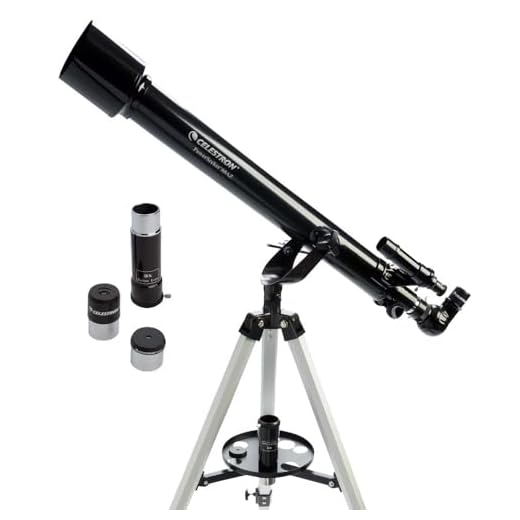
The Celestron PowerSeeker 60AZ is a refractor telescope with a 60mm aperture and 700mm focal length. It’s part of the AZ Power Seeker range from Celestron being the middle model between the 50AZ PowerSeeker and the 70AZ PowerSeeker.
Compared to the 50AZ model the 60AZ is a step up as it’s aperture is 60mm, 10mm more than the 50AZ which gives it slightly more power. But the aperture side is not the only improvement between these models. Although both telescopes are equipped with an altazimuth mount – where the AZ extension in the name comes from – it’s this model that has a slightly better mount as it’s movement is smoother and easier overall and has an altitude slow motion rod. In fact all models from the AZ PowerSeeker range starting with this model include this smoother mount.
Celestron PowerSeeker 60AZ Review Card
-
Manufacturer - 9.9/10
9.9/10
-
Optics - 9.4/10
9.4/10
-
Value - 9.7/10
9.7/10
Summary
A great beginner telescope from Celestron. Easy to setup and use and although it’s power is it’s weak point, the 2x barlow lens included in the package help. Overall a very solid refractor telescope aimed at the beginner or occasional astronomer who want a sleek looking telescope that will last you a lifetime.
The box comes with the optical tube which is the telescope itself, the findescope, 2 eyepieces (20mm, 4mm) along with a 3x barlow lens and correct image prism, an aluminium tripod with an accessory tray and the SkyX software.
Installing the telescopes and getting it ready for the first viewing was pretty easy and straight forward without the need of any additional tools, and even without the need of the manual as all components have their place and just by looking at the image of the box it’s easy.

With it’s alt-azimuth mount and correct image prism, this telescope is well suited for terrestrial viewing as well as star gazing. It’s weight is situated in the lower numbers but portability might be an issue for some with the optical tube length’s being 28 in (711 mm), not making it the best telescope in terms of portability but it is lightweight at 7lbs (3.18kg).
The aluminium tripod is stable on a flat surface might when going outdoor it’s overall stability might be a factor to take in consideration. If you plan on using the telescope in the home (e.g. attic ) or in your backyard, the stability of the tripod will not be an issue. The accessory tray that’s part of the tripod is very useful for storing the different eyepieces and components and having everything at your disposal and nicely organized.
The finderpiece is made of plastic which tends to take away from the sense of build quality of the telescope, but it helpful and does it’s job and given the telescope’s price point it’s not something to subtract from the overall value of the telescope.
Most telescopes include a astronomy software and the 60AZ model is no exception as it includes the SkyX First Light Edition software that it packed with useful information helping you get started with exploring the night sky and guide you as to what you can see and where you can see it. It had a 10,000 object database with printable sky maps (very fun and useful) and 75 enhances images.
Celestron PowerSeeker 60AZ pros:
One of the important pros are the clear images you’ll be able to get with this telescope. Fully glass coated optics insure great terrestrial as well of start night images. It’s powerful enough to explore the moon and it’s craters as well as get decent images of Jupiter and it’s moons along with other planets from out solar system and other prominent object in the night sky. The mount is a plus for this telescope as it’s got slow motion control for smooth tracking.
Celestron PowerSeeker 60AZ cons:
This is a good entry level telescope and given it’s price point there are not many cons to highlight. The tripod and finderscope can be mentioned as not raising up to the standards of the rest of the components but it’s only a minor thing that most users might not even notice.
Click here to check availability and price
Full Technical Specification:
| Optical Design | Refractor |
| Aperture (mm) | 60 mm (2.36 in) |
| Focal Length: 700 mm (28 in) | 700 mm (28 in) |
| Focal Ratio: 12 | 12 |
| Focal Length of Eyepiece 1 (mm) | 20 mm (0.79 in) |
| Magnification of Eyepiece 1 | 35 x |
| Focal Length of Eyepiece 2 (mm) | 4 mm (0.16 in) |
| Magnification of Eyepiece 2 | 175 x |
| Barlow Lens | 3 x |
| Finderscope | 5×24 |
| Star Diagonal | Erect Image Diagonal |
| Mount Type | Altazimuth |
| Accessory Tray | No-Tool Tray with Eyepiece holder |
| Tripod | Aluminum |
| Highest Useful Magnification | 142 x |
| Lowest Useful Magnification | 8.57 x |
| Limiting Stellar Magnitude | 11.4 |
| Resolution (Rayleigh) | 2.32 arc seconds |
| Resolution (Dawes) | 1.93 arc seconds |
| Light Gathering Power (Compared to human eye) | 73 x |
| Apparent Field of View | 1.2 ° |
| Linear Field of View (@1000 yds) | 61 ft (19 m) |
| Optical Coatings | Fully-Coated |
| Optical Tube Length | 28 in (711 mm) |
| Total Telescope Kit Weight | 7 lbs (3.18 kg) |

